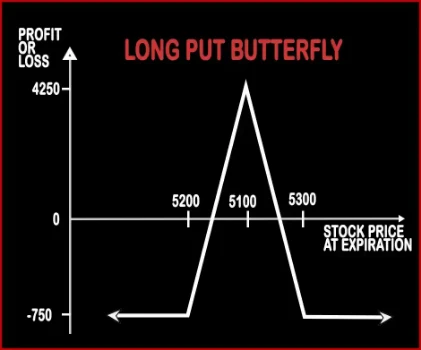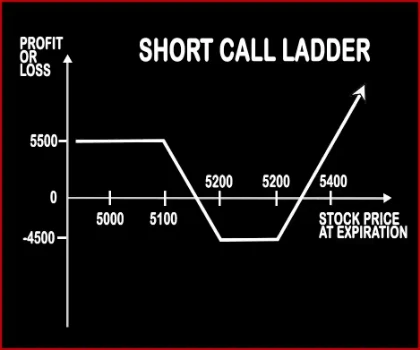Compare Strategies
| LONG PUT BUTTERFLY | SHORT CALL LADDER | |
|---|---|---|

|

|
|
| About Strategy |
Long Put Butterfly Option StrategyThe Long Put Butterfly is a neutral strategy where a trader will be bearish on the volatility i.e. he thinks the market will have sideways kind of movement and will not rally sharply in either direction in the near future. This strategy involves sale of 2 ATM Put Options, buy 1 ITM and 1 OTM Put Option. The risk and reward are limited. |
Short Call Ladder Option StrategyThis strategy is implemented when a trader is moderately bullish on the market, and volatility. It involves sale of an ITM Call Option, buying of an ATM Call Option & OTM Call Option. The risk associated with the strategy is limited. Risk:
|
LONG PUT BUTTERFLY Vs SHORT CALL LADDER - Details
| LONG PUT BUTTERFLY | SHORT CALL LADDER | |
|---|---|---|
| Market View | Neutral | Neutral |
| Type (CE/PE) | PE (Put Option) | CE (Call Option) |
| Number Of Positions | 4 | 3 |
| Strategy Level | Advance | Advance |
| Reward Profile | Limited | Unlimited |
| Risk Profile | Limited | Limited |
| Breakeven Point | Upper Breakeven Point = Strike Price of Highest Strike Long Put - Net Premium Paid, Lower Breakeven Point = Strike Price of Lowest Strike Long Put + Net Premium Paid | Upper Breakeven Point = Total Strike Prices of Long Calls - Strike Price of Short Call + Net Premium Received Lower Breakeven Point = Strike Price of Short Call - Net Premium Received |
LONG PUT BUTTERFLY Vs SHORT CALL LADDER - When & How to use ?
| LONG PUT BUTTERFLY | SHORT CALL LADDER | |
|---|---|---|
| Market View | Neutral | Neutral |
| When to use? | The Long Put Butterfly is a neutral strategy where a trader will be bearish on the volatility i.e. he thinks the market will have sideways kind of movement and will not rally sharply in either direction in the near future. | This strategy is implemented when a trader is moderately bullish on the market, and volatility |
| Action | Buy 1 OTM Put, Sell 2 ATM Puts, Buy 1 ITM Put | Sell 1 ITM Call, Buy 1 ATM Call, Buy 1 OTM Call |
| Breakeven Point | Upper Breakeven Point = Strike Price of Highest Strike Long Put - Net Premium Paid, Lower Breakeven Point = Strike Price of Lowest Strike Long Put + Net Premium Paid | Upper Breakeven Point = Total Strike Prices of Long Calls - Strike Price of Short Call + Net Premium Received Lower Breakeven Point = Strike Price of Short Call - Net Premium Received |
LONG PUT BUTTERFLY Vs SHORT CALL LADDER - Risk & Reward
| LONG PUT BUTTERFLY | SHORT CALL LADDER | |
|---|---|---|
| Maximum Profit Scenario | Strike Price of Higher Strike Long Put - Strike Price of Short Put - Net Premium Paid - Commissions Paid | Profit Achieved When Price of Underlying > Total Strike Prices of Long Calls - Strike Price of Short Call + Net Premium Received |
| Maximum Loss Scenario | When Price of Underlying <= Strike Price of Lower Strike Long Put OR Price of Underlying >= Strike Price of Higher Strike Long Put | Strike Price of Lower Strike Long Call - Strike Price of Short Call - Net Premium Received + Commissions Paid |
| Risk | Limited | Limited |
| Reward | Limited | Unlimited |
LONG PUT BUTTERFLY Vs SHORT CALL LADDER - Strategy Pros & Cons
| LONG PUT BUTTERFLY | SHORT CALL LADDER | |
|---|---|---|
| Similar Strategies | Iron Condors, Iron Butterfly | Short Put Ladder, Strip, Strap |
| Disadvantage | • Risk is higher than reward. • When the underlying price is in between the two breakeven points, time decay hurts the position. | • Unlimited risk. • Margin required. |
| Advantages | • Limited maximum loss. • Unlimited profit potential, risk only limited to loss of premium. • Benefits from low volatility. | • Higher probability of profit. • Unlimited upside profit. • Limited maximum loss. |